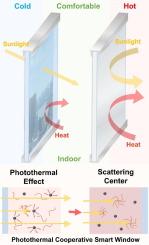Development and evaluation of the energy-saving effect of photothermal cooperative composite hydrogel smart window
IF 13.3
1区 工程技术
Q1 ENGINEERING, CHEMICAL
引用次数: 0
Abstract
Thermal responsive hydrogel smart windows have attracted wide attention due to their design flexibility and excellent thermal responsive optical properties. Only relying on temperature control, sometimes the phase transition speed is not fast to meet the needs of rapid thermal response rate in practical applications. Here, a hydrogel with excellent photothermal response characteristics was prepared through combining the photothermal conversion efficiency of graphene nanoparticles and the thermal response effect of hydroxypropyl cellulose. The photothermal cooperative hydrogel (PCH) smart window has integrated high solar modulation ability (ΔTsol = 61.2 %), excellent infrared isolation ability (ΔTIR = 48.6 %) and fast response speed (within 2 min) successfully. In outdoor demonstrations, the PCH window can reduce 13.1 °C compared to the ordinary window, showing promising energy-saving performance in summer daytime. Simulations suggested that PCH window can cut off 13.1 % heating, ventilation, and air-conditioning (HVAC) energy consumption compared with the Low-E window in Singapore. The PCH window can dynamically adjust solar radiation through light and heat, which provides a new strategy for intelligently reducing the energy consumption of buildings

光热协同复合水凝胶智能窗节能效果的开发与评价
热响应水凝胶智能窗因其设计灵活性和优异的热响应光学性能而受到广泛关注。仅依靠温度控制,有时相变速度不快,不能满足实际应用中快速热响应速率的需要。本文结合石墨烯纳米颗粒的光热转化效率和羟丙基纤维素的热响应效应,制备了具有优异光热响应特性的水凝胶。光热协同水凝胶(PCH)智能窗成功集成了高太阳调制能力(ΔTsol = 61.2 %)、优异的红外隔离能力(ΔTIR = 48.6 %)和快速响应速度(2 min以内)。在室外演示中,PCH窗与普通窗相比可降低13.1 °C,在夏季白天表现出良好的节能性能。模拟表明,与新加坡的Low-E窗相比,PCH窗可以减少13.1%的供暖、通风和空调(HVAC)能耗。PCH窗口可以通过光和热动态调节太阳辐射,为智能降低建筑能耗提供了一种新的策略
本文章由计算机程序翻译,如有差异,请以英文原文为准。
求助全文
约1分钟内获得全文
求助全文
来源期刊

Chemical Engineering Journal
工程技术-工程:化工
CiteScore
21.70
自引率
9.30%
发文量
6781
审稿时长
2.4 months
期刊介绍:
The Chemical Engineering Journal is an international research journal that invites contributions of original and novel fundamental research. It aims to provide an international platform for presenting original fundamental research, interpretative reviews, and discussions on new developments in chemical engineering. The journal welcomes papers that describe novel theory and its practical application, as well as those that demonstrate the transfer of techniques from other disciplines. It also welcomes reports on carefully conducted experimental work that is soundly interpreted. The main focus of the journal is on original and rigorous research results that have broad significance. The Catalysis section within the Chemical Engineering Journal focuses specifically on Experimental and Theoretical studies in the fields of heterogeneous catalysis, molecular catalysis, and biocatalysis. These studies have industrial impact on various sectors such as chemicals, energy, materials, foods, healthcare, and environmental protection.
文献相关原料
公司名称
产品信息
阿拉丁
Ammonium persulfate
阿拉丁
N, N-methylene bisacrylamide
阿拉丁
Acrylamide
阿拉丁
Ammonium persulfate (APS)
阿拉丁
N, N-methylene bisacrylamide (BIS)
阿拉丁
Acrylamide (AM)
 求助内容:
求助内容: 应助结果提醒方式:
应助结果提醒方式:


